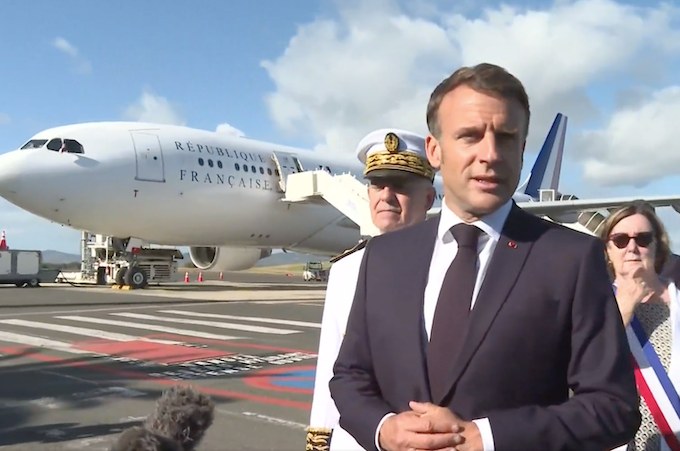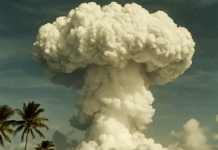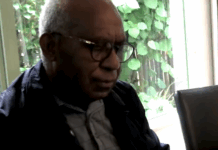
By Lydia Lewis, RNZ Pacific journalist
French president Emmanuel Macron has landed in Nouméa.
The French Ambassador to the Pacific Véronique Roger-Lacan was on the flight.
“The unrest in New Caledonia is absolutely unacceptable,” Roger-Lacan told RNZ Pacific in an interview.
- READ MORE: Liberation for New Caledonia’s Kanak people ‘must come’, says media educator — Audio
- President Emmanuel Macron to fly to New Caledonia within hours
- ‘You are not alone’ Pacific messages of solidarity for Kanaky
- Other Kanaky New Caledonia crisis reports
She had just arrived back from Caracas where she represented France at this week’s United Nations seminar on decolonisation.
“As far as the French state is concerned, our door is open, we are welcoming everyone for dialogue, in Paris or in Nouméa. It’s up to everyone to join further dialogue,” Roger-Lacan said.
Roger-Lacan said the unrest had been provoked by very specific parts of the New Caledonian establishment.
She said she made a plea for dialogue at the United Nations decolonisation seminar in light of the deadly protests in New Caledonia.
‘Up to all the parties’
“Well, what I want to say is that the Nouméa agreement has enabled everyone in New Caledonia to have a representation in the French National Assembly and in the Senate,” Roger-Lacan said.
“And it is up to all the parties, including the independantistes, who have some representatives in the National Assembly and in the Senate, to use their political power to convince everyone in the National Assembly and in the Parliament.
“If they don’t manage [this], it is [an] amazingly unacceptable way of voicing their concerns through violence.”
While the French government and anti-independence leaders maintain protest organisers are to blame for the violence, pro-independence parties say they have been holding peaceful protests for months.
They say violence was born from socio-economic disparities and France turning a deaf ear to the territorial government’s call for a controversial proposed constitutional electoral amendment to be scrapped.
Roger-Lacan said while “everyone” was saying this unrest was called for because they were not listened to by the French state, France stands ready for dialogue.
She said just because one group failed to “use their political power to convince the Assembly and the Senate”, it did not justify deadly protests.
Composition questioned
A long-time journalist reporting on Pacific issues said the composition of the French President’s delegation to New Caledonia would anger pro-independence leaders.
Islands Business correspondent Nic Maclellan said Macron would be accompanied by the current Overseas Minister Gérald Darmanin and Armed Forces Minister Sébastien Lecornu.
“They will no doubt be welcomed by supporters of the French republic, anti-independence politicians who want to stay with France but Lecornu and Darmanin have been responsible for key decisions taken over the last three or four years that have lead to this current crisis,” Maclellan said.
President Macron has said the main objective of the trip is to resume political talks with all stakeholders and find a political solution to the crisis.
United Nations decolonisation
This year Véronique Roger-Lacan represented France at the table at a seminar which took place in the lead up to the UN Committee on Decolonisation in New York in June.
The right to self determination is a constitutional principle in the French constitution as much as it is in the UN Charter, Roger-Lacan explained.
The meeting she has just been at in Caracas, “prepares a draft, UN General Assembly resolution, that is being examined in the committee, which is called the C-24,” she said.
Roger-Lacan was appointed to the role of French ambassador to the Pacific in July last year.
Various groups have been calling for the United Nations to head a delegation to New Caledonia to observe the current situation.
Roger-Lacan said the New Caledonia coalition government representative and the FLNKS representative both called for a UN mission at the meeting.
“Then there were five representatives of the loyalists and they all made the case of the fact that a third referenda had been in compliance with the two UN General Assembly resolutions determining the future status of New Caledonia,” she said.
As the representative of the French state, she made the case that France had always been the only administrative power to sit in the C-24 — “and to negotiate and cooperate,” she said.
“The United States, New Zealand, and the United Kingdom never did that,” Roger-Lacan said.
She also welcomed the UN, “whenever they want to visit”, she said.
“That’s the plea that I made on behalf of the French government, a plea for dialogue.”
This article is republished under a community partnership agreement with RNZ.












































